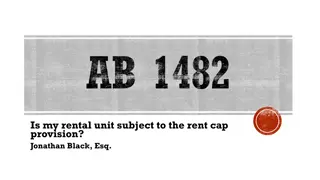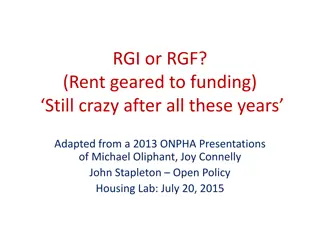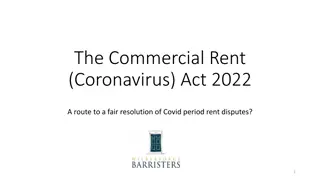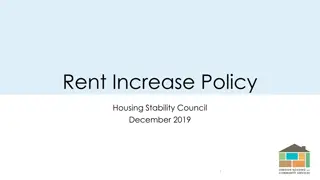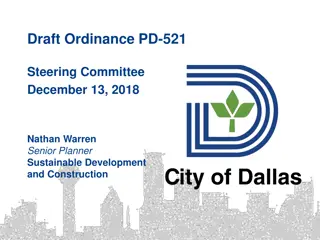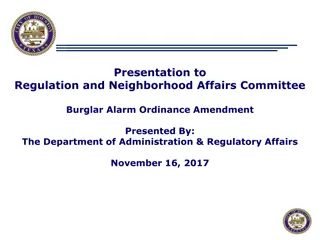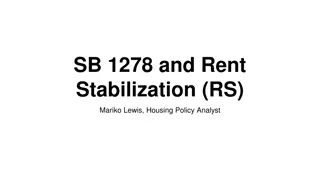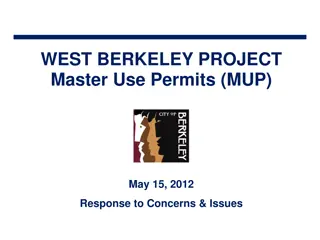
Addressing Housing Crisis: Strategies for Affordable Renting
"To combat the housing crisis, Wilmington must adopt multiple strategies including increasing housing supply, offering subsidies, and implementing rent stabilization. Policies like establishing a Housing Trust and inclusionary zoning are crucial. Renters, especially ALICE households, are facing financial strain, making rent stabilization vital. Learn from comparable cities with successful rent stabilization measures to create a sustainable housing solution."
Download Presentation

Please find below an Image/Link to download the presentation.
The content on the website is provided AS IS for your information and personal use only. It may not be sold, licensed, or shared on other websites without obtaining consent from the author. If you encounter any issues during the download, it is possible that the publisher has removed the file from their server.
You are allowed to download the files provided on this website for personal or commercial use, subject to the condition that they are used lawfully. All files are the property of their respective owners.
The content on the website is provided AS IS for your information and personal use only. It may not be sold, licensed, or shared on other websites without obtaining consent from the author.
E N D
Presentation Transcript
Rent Stabilization SUBSTITUTE NO. 1 TO ORD 25-016
Solving the housing crisis requires 3 complementary approaches 1. Increase housing supply 2. Provide more subsidies 3. Provide stability for renters There s no one silver bullet to this issue. One policy may solve some parts, but could leave gaps. We have to find complementary policies to meet the needs of everyone, including working families who don t qualify for most subsidies, such as Asset Limited, Income Constrained, Employed Households (ALICE)
Wilmington must invest in building more housing. However that alone will not solve the housing crisis. Building more units is supposed to free up older housing for low-income residents, but it takes too long to be effective. Most new units being built are not affordable. The City of Wilmington is incentivizing building without requiring affordability.
Other policies are on the table Establish a Housing Trust Require inclusionary zoning for new buildings in Wilmington
Renters are struggling statewide Overall in the state, 50% of renters face cost burden. Cost burdened means a renter is paying more than 30% of their income on rent. There are 11,000 more cost-burdened renters compared to 2010. Of Of Delaware's 402,334 households 29% were ALICE, meaning Asset Limited, Income Constrained, Employed earning more than the Federal Poverty Level, but not enough to afford the basics where they live. Sources: DSHA Statewide Housing Needs Assessment 2023-2030. United for Alice (2022)
Rent stabilization policies limit how high landlords can raise rent each year. Source: Rent Matters: What are the Impacts of Rent Stabilization Measures? An overview of rent stabilization from national housing experts | Federal Reserve Bank of Minneapolis
Comparable cities with rent stabilization Gardena, CA (city of approx. 60,000), caps annual rent increases at no more than 5% + CPI increases, not to exceed 10% total. Santa Monica, CA (city of 90,000), no more than 3% increase in rent allowed. This policy has been in place for many years, with multiple amendments. Randolph Township, NJ (jurisdiction of approx. 25,000) that limits annual rent increases to no more than 6%, referred to as rent leveling .
Rent stabilization limits rent increases Landlords would still be able increase the rent, however it would be limited each year Landlords could request to increase higher than the limit, if they have increases to operating costs, repairs, or renovations. They could also increase if insurance or property taxes increase.
When can landlords raise the rent higher than the limit? Landlords can request exceptions to the limitation on rent increases under the following circumstances: Changes in property taxes and insurance premiums Maintenance and operative expenses Renovations or improvements to the home (not ordinary repairs, or replacement maintenance)
New Buildings Exempted for first 10 years New buildings will be exempted for the first ten years, so developers can recoup funds spent. After 10 years, those buildings would be rent stabilized. Applies to buildings finished after the passage of the bill.
The legislation creates the Housing Stability Subcommittee Purpose Monitor the implementation and effectiveness of rent stabilization policies; Collect and review data on housing costs, development, displacement, and affordability, and tenant protections; Recommend long-term affordable housing strategies; Provide a recommendation on whether to sunset, extend, or amend rent stabilization provisions within four (4) years of enactment.
Housing Stability Subcommittee Membership Appointed by City Council President Two (2) members of City Council One (1) representative from the Department of Real Estate and Housing One (1) representative from the City Planning Department Two (2) community-based housing advocates One (1) tenant representative One (1) affordable housing developer One (1) landlord representative
Proposed Change: Allow for rent increases up to 5% or CPI, whichever is greater (rather than 3% or CPI, whichever is lower) What does this change mean? Why make this change? Provide more flexibility for landlords to increase rent, especially if inflation is higher from one year to another. Landlords would be allowed to increase rent by 5% or by Consumer Price Index (inflation). If inflation is higher than 5%-- for example 6%-- then landlord would be allowed to increase rent by 6%.
Proposed Change: Exempt rental units being rented for the first time ever What does this change mean? Why make this change? Allows landlords to set base rent for units that have not been rented yet. Any rental unit being rented for the first time ever would not be rent stabilized. However, it would be stabilized after that first year. This does not impact units that turn- over from one tenant to another.
Proposed Change: Add additional landlord and real estate representation to the Housing Stability Subcommittee What does this change mean? Why make this change? Add additional landlord and real estate representation to the Housing Stability Subcommittee, for a total of 2 landlords and 1 real estate rep. Ensure landlord voice and realtor voices are balanced on the Housing Stability Subcommittee



